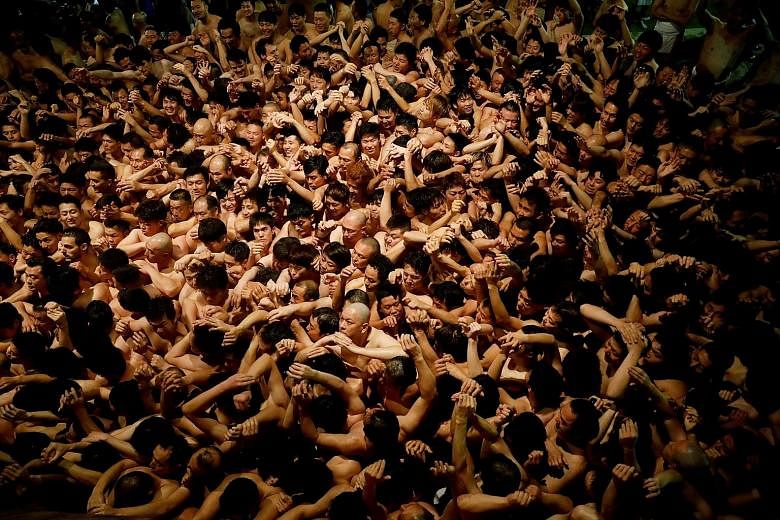Thousands of sweaty, almost nude men, clad only in loincloths, rubbed their bodies against one another as they jostled to snatch a lucky charm tossed by a priest at a 500-year-old festival at a temple in Okayama, in western Japan, last Saturday.
In Tokyo, Japanese pop rock band Mrs Green Apple performed to sellout crowds at Yoyogi National Gymnasium in the youth hub of Harajuku, with the five-member outfit reminding concertgoers to practise good hygiene in the light of the coronavirus outbreak.
So far, little has changed beyond noticeably smaller crowds at tourist hot spots, from old-town Asakusa and glitzy Ginza in Tokyo to the Arashiyama bamboo forest in Kyoto, given the drastic plunge in Chinese tourists.
But Japan has reached a turning point in its fight against the coronavirus outbreak, as the number of cases surged from just 29 last Thursday to 66 as of last night, raising concerns that a silent killer may be on the loose.
On Sunday, Health Minister Katsunobu Kato urged citizens to avoid leaving home unnecessarily and to steer clear of crowded places and non-essential gatherings as part of a community effort to fight the spread of the virus.
That did little to stop workers from packing Tokyo's trains in the rush-hour commute, or deter people from going out. But some events have been cancelled or scaled down.
"We believe local transmission is already ongoing," Dr Shigeru Omi, chief director of the Japan Community Health Care Organisation, told reporters yesterday.
"Our reading is that we are on the verge of entering from the 'early stage' to the 'accelerating phase'."
He disagreed with criticism that government measures were belated, saying that its approach was being calibrated according to available epidemiological data.
Support for Prime Minister Shinzo Abe's Cabinet dropped in three separate media polls at the weekend, albeit also due to a series of domestic scandals.
The acknowledgement that community spread has likely occurred led to the cancellation of Emperor Naruhito's customary public greeting on his 60th birthday on Feb 23.
It would have been his first such event since his coronation last year.
Tens of thousands of well-wishers usually attend the event at the Imperial Palace in Tokyo.
The Tokyo Marathon, Asia's largest race and an Olympic qualifier event, on March 1 has also been scaled down, with only 200 elite athletes allowed to compete.
In an unprecedented decision, the marathon has banned the 38,000 members of the public who signed up as general participants.
Another major event, the country's largest photo industry trade show, which was to have taken place in Yokohama next week, has also been scrapped.
Some companies have enforced telework arrangements, including telecommunications giant NTT Group, which told its 200,000 employees to either work from home or go to work at off-peak hours.
A man in his 20s who lives in Chiba prefecture and works at one of the group's companies, NTT Data, tested positive for the coronavirus last week. This was one of at least four cases where the source of infection could not be traced.
Dr Omi said the virus might have gained the ability to spread widely and efficiently as experts such as quarantine officers and medical doctors had also fallen sick.
Yesterday, a Health Ministry official who was deployed on the Diamond Princess cruise ship, off the coast of Yokohama, became the third confirmed case linked to the luxury liner.
On board, another 99 people tested positive, bringing the total number of cases to 454 as countries began to evacuate their citizens despite the quarantine period ending only tomorrow.
The United States flew home more than 300 of its citizens on two chartered planes on Sunday, although some chose to stay to avoid further quarantine back home.











